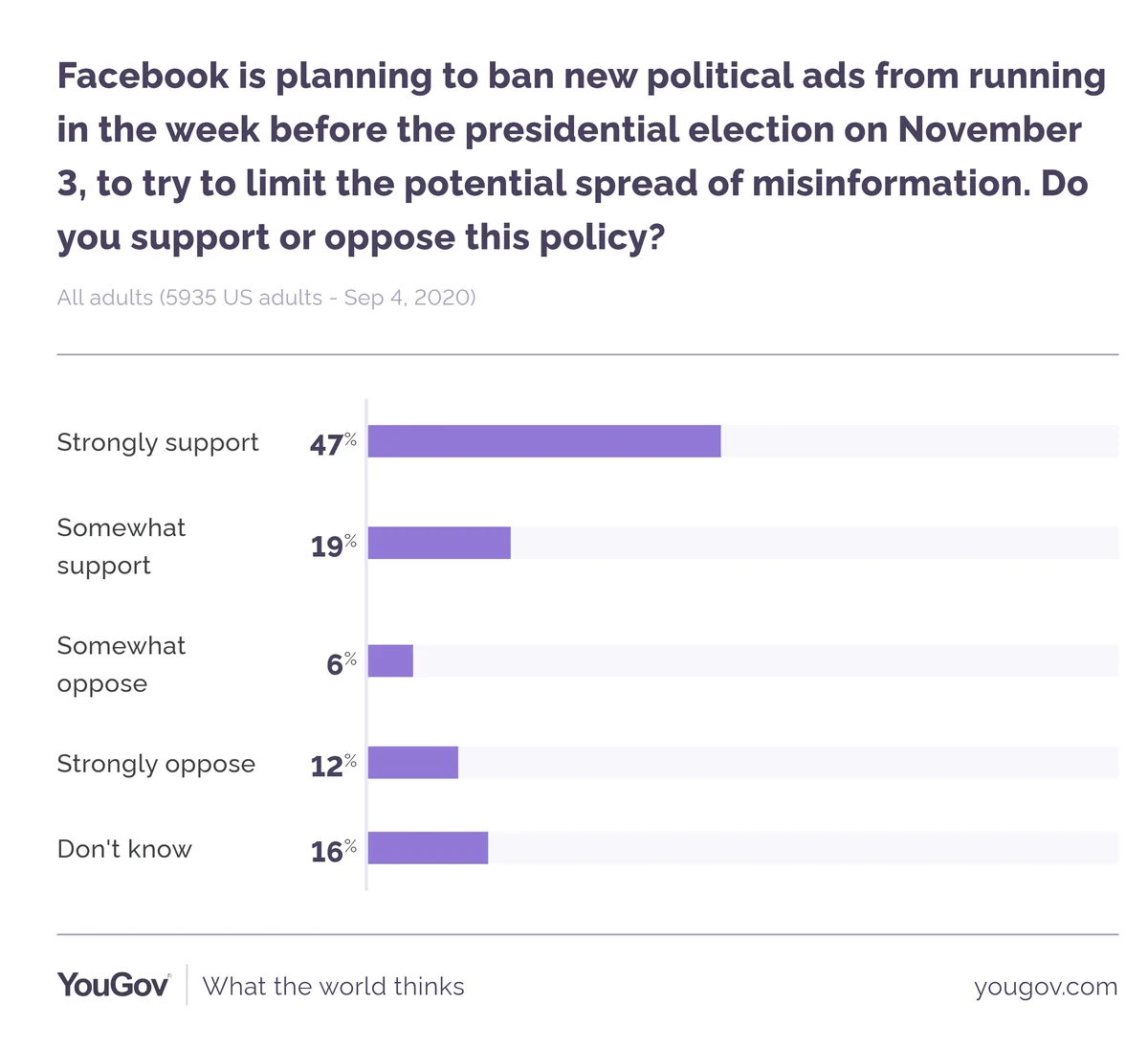“This election is not going to be business as usual” wrote Mark Zuckerberg in a post announcing Facebook’s decision to ban all political ads a week prior to election day (November 3rd).
Two thirds of Americans approve of Zuckerberg’s decision, according to a recent YouGov survey (66%).

But will anything change? We asked our YouGov Chat users to go deeper and tell us what they really think about Facebook's new ban. You can share your views on whether Facebook should ban political ads here.
“I think political talk has a time and place. I don’t think social media is that place.”
When we asked Chat users why they support the ban, over half of all 4029 comments centred on the belief that doing so would prevent the spread of misinformation (51%). “Too much false information is already on the platform” wrote one user, “as well as no way to stop the dissemination of information that is untrue, once it has been posted.”
Users are not alone in this view. Kim Kardashian-West recently announced she would be freezing her Facebook page on the grounds that the platform enables the spread of "hate, propaganda and misinformation".
Chat users were split over whether Facebook would actually be able to enforce the ban. “Facebook has proven itself inept at stopping the spread of misinformation. By banning political ads the last week, it at least limits the impact of the misinformation.” wrote one user. They were unified, however, in their belief that a week ban wouldn't be enough - “I think they should be banned in the last 30 days leading up to election day” argued one user. “I've started to think maybe they should disallow political content altogether, since there's no way to vet the information being spread” wrote another.
A smaller, but still significant, number of chat users cited fears of foreign influence as justification for supporting the ban. “They can’t separate legitimate ads from foreign interference” argued one user. When talking about foreign interference in relation to political ads, most users referenced Russia. “Some ads could actually be Russian bots giving false information” reasoned one user, “look at what happened in 2016.”
When discussing their support for the ban, some users took the opportunity to put forward the kind Facebook they want for America. “I get tired of trying to guess what the truth really is” was a sentiment echoed by many chat users. “Facebook is Social Media..” wrote another, “..a place to look up old friends and keep in contact with loved ones. I get that in order to keep it free we see Advertising but let's keep it light without all the Political Drama and Lies.”
“Open dialogue in the virtual public square is important”
Nearly one in five Americans, however, were not on board with the ban (18%). Unsurprisingly most arguments put forward by Chat users who did not agree with Facebook's decision revolved around ‘freedom of speech’ (49%). “Political ads should be available on all media by all politicians. We are a country founded on free speech” wrote one user, “we do not ban speech because we don’t like it.”
Others Chat users argued against the ban on the basis that such a decision was unfair to both political candidates (“I think candidates should be able to make their case”) and voters (“Voters should have access to what the candidates and their representatives are saying. It's not social media's job to intervene in politics”). This was also Zuckerberg's argument a year ago when he dismissed the idea of such a ban, saying "banning political ads favors incumbents and whoever the media chooses to cover.”
A small number of users pointed out that it can be difficult to define what is and is not ‘political’ nowadays. “[There is] No criteria on WHAT is political” wrote one user, “politics invades every element of our lives.” Another wrote “No news source is reliable or spreads information that is true. They all have biases and spread what news fits their agenda best. Social media is the same.”
Most Chat users - regardless of their reason for opposing the ban - framed their comments in partisan terms. “Facebook says this applies to both candidates, but we all know they only are doing this to harm Trump.” wrote one user. Another said justified their anti ban stance on the grounds that “Facebook’s banning of political ads is unfairly aiding the Republican ticket.”
YouGov Chat also asks participants to consider the other side of the debate. Users that believe Facebook should not ban political ads said the strongest reason to support such a ban was the argument that it would “prevent spread of misinformation” (33%). A future 26 percent said the most compelling reason why someone might support the ban would be because it “helps their preferred candidate.”
--------------
Everyday, members of YouGov Chat are asked to share their opinion on a topic in the news. We allow anyone to take part in these chats, and do not display or weight results in real-time. Instead, to make the experience informative but still interactive, the chat displays weighted data from YouGov Direct to show them how the rest of the country voted. This enables us to pose the question to all, while retaining data accuracy and validity when communicating results.
YouGov chat seeks to add to the ‘what?’ (the quantitative poll result) by finding the ‘why?” (qualitative open ends) in a member’s own words. Learn more about YouGov Chat here.










